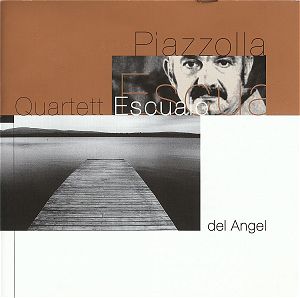Violin, Viola, (Istvan Kerek) Guitar (Albert
Mayer).
Double-bass, (Peter Acs). Accordion, (Zsolt
Deli).
1 Violentango.
2 Meditango.
3 Fuga y Misterio.
4 Oblivion.
5 Michelangelo.
6 Adios Nonino.
7 Escualo.
8 Milonga del Angel.
9 La Muerte del Angel.
10 Resurrection del Angel.
11 Fugata (Silfo y Ondina No.2).
12 Libertango.
It would be easy to dismiss
this CD by glancing at its unassuming cover.
And we have a seemingly unlikely
marriage between Piazzolla, the Argentinean
Tango composer, who has only but recently
found favour in the UK’s classical strata,
with a Hungarian ensemble.
In the Piazzolla Tango lies
the spectrum of all human feeling, and despite
the fact that the Tango earned its superficially,
lurid reputation as the nearest thing to vertical
copulation in public, Piazzolla empowered
it with a depth of expression far beyond that
of a one-night stand.
Here is music that reflects
all the joys and sorrows of life.
So where is the Hungarian
link? Why is this a powerful CD?
What makes this such a spell-binding
musical experience?
Could it be some link between
the Hungarian Gypsy inheritance and the exportation
of the Spanish Gypsy influences?
This is a classically trained
group of musicians who came together in 2002,
ten years after Piazzolla died and they intend
to be part of the process of Piazzolla’s dream
of, "putting the Tango on the concert
platform."
The intonation of the double
bass never wavers, the guitar is full of sensitive
colours, the accordion registrations are beautifully
executed, the violin sings and the viola,
- an unlikely instrument in such an ensemble,
takes on the role of saxophone.
The classical elements are
undeniable, there are fugal expositions and
hints of sonata development and it is all
pushed along by an ongoing desperation encapsulated
in a compulsive rhythmic drive
But it is the raw emotion
that grips the listener. Ostensibly sentimental
tunes are transformed into catastrophe by
discords redolent of thwarted desires.
Nervous crises barge into
the music like untimely deaths.
This is the reckless world
of the uninhibited.
If Piazzolla was looking
for exponents to continue the Tango Dream,
Quartett Escualo are true disciples.
For Tango lovers and anyone
who enjoys deeply impassioned music this CD
is a must!
Adrienne Fox.
